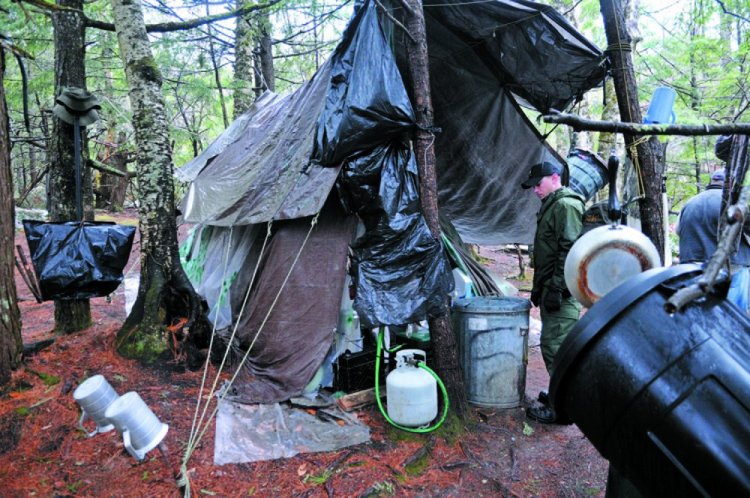The attorney for the man known as the North Pond Hermit says Christopher Knight should not have to pay $1,125 restitution for costs incurred by state police for removing a roadway they created to reach his remote campsite in Rome.
Knight grew up in Albion and then spent some 27 years alone in the woods in campsites he outfitted with items stolen from Rome and Smithfield cottages and camps. In 2015, he was sentenced on burglary and theft charges and ordered to serve seven months in jail — time he had already served — and the remainder of the five-year sentence was suspended. He was also ordered to serve three years on probation.
The state says Knight should be required to pay $1,125 for “environmental cleanup expense,” which was part of the $1,500 restitution assessed at Knight’s sentencing hearing on March 23, 2015.
Knight’s attorney, Walter McKee, wants the state supreme court to vacate the $1,125 restitution.
All other restitution ordered as part of the sentence had been paid.
“This appeal is really about just how far the state can stretch the meaning of ‘restitution,'” McKee said in a statement emailed Monday night. “At a certain point it become absurd for the state to even request restitution and the request here is beyond absurd and approaching ridiculous.”
In the appeal brief, McKee argues, “If the state is allowed to claim restitution as it has requested in this case then every time law enforcement clears a homeless person’s tent from some abandoned area the person whose meager shelter is taken away can be charged with the ‘environmental clean-up’ expense in doing so. The state could also make that person pay for the gas the police used to get to the campsite and all expenses connected to the non-environmental ‘clean-up.’ This would be grossly unfair and absurd.”
The opposing brief by student-attorney Emily Collins of the Kennebec County District Attorney’s Office, says restitution was properly imposed.
“Mr. Knight hid the fruit of his crimes at his inaccessible campsite on Lisa Fitzgerald’s land; the police had to construct a road in order to reach this campsite, locate and collect evidence of the crimes, then clean and restore the property of Lisa Fitzgerald by deconstructing the road they built,” Collins writes.
Knight, now 50, is living in the community and remains on probation, which is set to terminate in March 2018, according to the state Department of Corrections website. McKee said he was unsure where Knight was living, but indicated Knight will not attend the oral arguments set for next week in East Machias.
Knight’s arrest in April 2013, first reported by the Kennebec Journal, sparked worldwide media interest. Knight was seen by some as a folk hero, admired for his ingenuity and survival skills while living in the Maine woods for decades. For many victims of his burglaries though, Knight represented a troublesome thief who made them fearful and angry, and they were glad when he was behind bars. Knight’s story also inspired songs, a documentary film and a marriage proposal.
At Knight’s sentencing hearing, which came after he completed a specialty court program designed to help people with substance abuse and mental health problems, Justice Nancy Mills said, “The most important thing that Christopher has told me since October 2013 is that he has learned in this court that he can live the life he wants to live without breaking the law.”
Knight entered the Co-Occurring Disorders Court Program in October 2013 after pleading guilty to 13 burglaries and thefts in Rome and Smithfield — a fraction of the estimated 1,000 burglaries and thefts he committed over the years.
Knight was arrested April 4, 2013, by Maine State Trooper Diane Perkins-Vance and Sgt. Terry Hughes of the Maine Warden Service as Knight was leaving the dining room of the nonprofit Pine Tree Camp in Rome laden with foodstuffs lifted from the freezer as well as tools.
At that time, Knight told Perkins-Vance he had not spoken to his family since the mid-1980s.
He told her that was about the same time he had last bought anything. Everything he had — except for his eyeglasses — was stolen, he said.
Knight told investigators he stole from empty camps almost exclusively at night, stepping on rocks where possible, careful not to leave a trail.
People with homes and camps on North, East and Little North ponds were repeat victims over the years of thefts of clothing, batteries, propane tanks, books, beer, food, camping gear and more. Several enterprising owners of private camps, frustrated with repeated thefts, caught images of him on game cameras as he peered into their refrigerators and cupboards. Some people left food and items out for him along with notes asking him to leave the rest of their items alone.
After building the road and emptying Knight’s campsite in the Rome woods, Maine State Police filled two garages with goods recovered and invited victims to reclaim their goods, but few people did so.
In briefs filed in connection with the restitution case, McKee says restitution “is only allowed for true ‘economic loss.”
In fact, Knight’s motion to correct sentence, which was denied in October, said he had not caused the damage for which the state police sought restitution.
The Maine Supreme Judicial Court is set to hear oral arguments in the case at 9 a.m. May 5 at Washington Academy in East Machias.
Copy the Story LinkSend questions/comments to the editors.





Success. Please wait for the page to reload. If the page does not reload within 5 seconds, please refresh the page.
Enter your email and password to access comments.
Hi, to comment on stories you must . This profile is in addition to your subscription and website login.
Already have a commenting profile? .
Invalid username/password.
Please check your email to confirm and complete your registration.
Only subscribers are eligible to post comments. Please subscribe or login first for digital access. Here’s why.
Use the form below to reset your password. When you've submitted your account email, we will send an email with a reset code.